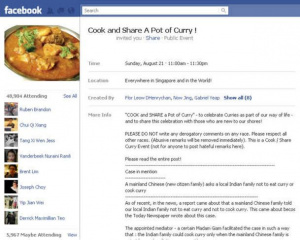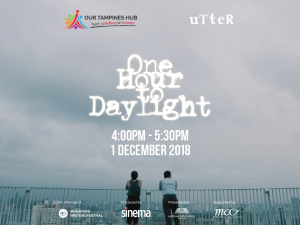Curry dispute (2011)
On 8 August 2011, local newspaper TODAY reported on a Community Mediation Centre case that involved a Chinese and Indian family.[1] The Community Mediation Centre is a body under the Ministry of Law in Singapore.[2] The Chinese family had filed a complaint against their Indian neighbours due to their aversion to the smell of the curry which the Indian family cooked on a regular basis. The mediator concluded the case by ruling that the Indian family could only cook curry when the Chinese family was not at home.[3] The conclusion of the case sparked reactions from the Singaporean online community wherein many were unsatisfied.
Details of the incident
In the TODAY report titled 'WHEN NEIGHBOURS DISAGREE', it was revealed that the Chinese family had recently migrated to Singapore from mainland China.[4] They were not accustomed to the smell of Indian curry and had found it unpleasant. They then reported their issue to the Community Mediation Centre (CMC). According to the CMC website, their mission is "To provide an attractive, practical and convenient solution for social and community disputes in Singapore".[5] The TODAY report also stated that the Indian family were already aware of the Chinese family’s complaints and had taken active measures to minimise the smell.[6] These measures included closing their windows and doors whenever they cooked the dish.
However, these measures were insufficient in solving the issue as the Chinese family had asked the Indian family to not cook or eat the curry at all.[7] The requests were met with disagreement by the Indian family and the case was concluded through the mediator’s ruling.[8] The settlement reached was that the Indian family would only cook curry when the Chinese family was not at home. In return, the Chinese family were expected to try the dish.
Responses
Netizens
The final conclusion drew flak from Singapore's online community. Netizens believed that the settlement was skewed towards the Chinese family and promoted intolerance towards respecting the cultural practices of other ethnic groups in Singapore.[9] Some netizens expressed that since the Chinese family were foreigners, they should have have been the ones to adapt.[10]
On 14 August 2011, netizen Michelle Teo uploaded a 3-minute long video on YouTube titled ‘Please Respect Curry’. In her video, she criticised the Chinese family for being intolerant of their Indian neighbours’ cultural practices.[11] The video gained 9,000 views, 375 likes and 34 dislikes in the span of 3 days. The video (YouTube video) had been reposted by YouTube user Alexandria School of Science on 14 August 2014.
On the other hand, some netizens urged Singaporeans and foreigners to display mutual respect for one another and encouraged Singaporeans to be less xenophobic.[12]
On 11 August 2011, netizen Florence Leow created the Facebook page called ‘Cook and Share a Pot of Curry’ in response to the incident.[13] The page had aimed to get Singaporeans to cook curry at home on 21 August 2011 and to invite foreigners to try the local dish. The page garnered over 57,600 members in 2011.[14] On 21 August 2011, the organiser Florence Leow prepared Peranakan style chicken curry, Indian vegetable curry and Japanese curry for visitors to enjoy. 11 people were invited to her home in Toa Payoh East to share the curry, some of whom were newly arrived migrants.[15]
Three presidential candidates for the 2011 presidential elections, Dr Tan Cheng Bock, Mr Tan Jee Say and Dr Tony Tan also joined the ‘Cook and Share a Pot of Curry’ campaign.[16] They participated in the nationwide curry cooking event in various constituencies on 21 August 2011. Dr Tan Cheng Bock also explained his views towards the incident stating that when one chooses to come to Singapore, they essentially also choose a "multiracial lifestyle".[17]
Community Mediation Centre (CMC) & Minister for Law K Shanmugam
On 11 August 2011, the CMC explained in a press release that the mediator was completely non-partisan and unbiased. They clarified that the final resolution had been accepted by both families and the ruling was based on suggestions by both parties involved in the dispute.[18]
During a press conference on 16 August 2011, Minister for Law K Shanmugam clarified that the actual curry dispute case had occurred 7 years ago in 2004.[19] He noted that it was important for Singaporeans not to view the issue in isolation and should acknowledge that "these sorts of differences exist between Singaporeans, among foreigners, between foreigners and Singaporeans".[20] He also added that such differences do not just exist in Singapore. Minister for Law K Shanmugam urged Singaporeans to refrain from launching "xenophobic attacks" from this one incident.
TODAY
On 17 August 2011, TODAY published an article to address the misrepresentation of the mediator in the curry dispute. The editor of TODAY, Walter Fernandez clarified that the 2004 dispute had been used as an example of the cases handled by the Community Mediation Centre.[21] The case had been offered to the newspaper by the mediator during an interview. TODAY acknowledged its mistakes in terms of inaccurately portraying the incident.[22]
'One Hour to Daylight' local film
In 2016, the local film ‘One Hour to Daylight’ was released. The film was partly inspired by the curry dispute and the first scene featured a Chinese lady scolding her Indian neighbours for cooking curry.[23] The film’s creative producer Nicholas Chee stated that the curry incident sparked "discussion of xenophobia and racism" which fit in with the overarching theme of the film.[24] ‘One Hour to Daylight’ was part of the Singapore Writers Festival’s Utter 2016 programme and was screened at Golden Village Suntec City theatres on 19 and 25 September 2016.[25]
References / Citations
- ↑ Moore, Malcolm. “Singapore's 'anti-Chinese curry war’”. The Telegraph. August 16, 2011. Accessed on 13 February 2019. Retrieved from: https://www.telegraph.co.uk/news/worldnews/asia/singapore/8704107/Singapores-anti-Chinese-curry-war.html
- ↑ Kaifong. “Shanmugam clarifies ‘curry issue’”. YahooNews. August 17, 2011. Accessed on 13 February 2019. Retrieved from: https://sg.news.yahoo.com/blogs/singaporescene/shanmugam-clarifies-curry-issue-050053270.html
- ↑ Moore, Malcolm. “Singapore's 'anti-Chinese curry war’”. The Telegraph. August 16, 2011. Accessed on 13 February 2019. Retrieved from: https://www.telegraph.co.uk/news/worldnews/asia/singapore/8704107/Singapores-anti-Chinese-curry-war.html
- ↑ Quek, Carolyn. “WHEN NEIGHBOURS DISAGREE”. TODAY. August 8, 2011. Accessed on 13 February 2019. Retrieved from: http://eresources.nlb.gov.sg/newspapers/Digitised/Article/today20110808-1.2.23.2
- ↑ "Mission and Logo". Community Mediation Centre. Accessed on 29 May 2019. Retrieved from: https://www.mlaw.gov.sg/content/cmc/en/About_Us/Mission_and_Logo.html
- ↑ Quek, Carolyn. “WHEN NEIGHBOURS DISAGREE”. TODAY. August 8, 2011. Accessed on 13 February 2019. Retrieved from: http://eresources.nlb.gov.sg/newspapers/Digitised/Article/today20110808-1.2.23.2
- ↑ Quek, Carolyn. “WHEN NEIGHBOURS DISAGREE”. TODAY. August 8, 2011. Accessed on 13 February 2019. Retrieved from: http://eresources.nlb.gov.sg/newspapers/Digitised/Article/today20110808-1.2.23.2
- ↑ Quek, Carolyn. “WHEN NEIGHBOURS DISAGREE”. TODAY. August 8, 2011. Accessed on 13 February 2019. Retrieved from: http://eresources.nlb.gov.sg/newspapers/Digitised/Article/today20110808-1.2.23.2
- ↑ Moore, Malcolm. “Singapore's 'anti-Chinese curry war’”. The Telegraph. August 16, 2011. Accessed on 13 February 2019. Retrieved from: https://www.telegraph.co.uk/news/worldnews/asia/singapore/8704107/Singapores-anti-Chinese-curry-war.html
- ↑ Moore, Malcolm. “Singapore's 'anti-Chinese curry war’”. The Telegraph. August 16, 2011. Accessed on 13 February 2019. Retrieved from: https://www.telegraph.co.uk/news/worldnews/asia/singapore/8704107/Singapores-anti-Chinese-curry-war.html
- ↑ Lim, Alvin. “Online video further stirs hot 'curry' issue”. The New Paper. August 17, 2011. Accessed on 13 February 2019. Retrieved from: https://www.smu.edu.sg/sites/default/files/smu/news_room/smu_in_the_news/2011/sources/TNP_20110817_1.pdf
- ↑ Suhartono, Harry. “Singaporeans' culinary anti-immigration protest: curry”. Reuters. August 22, 2011. Accessed on 13 February 2019. Retrieved from: https://www.reuters.com/article/uk-singapore-curry-idUSLNE77L01020110822
- ↑ Suhartono, Harry. “Singaporeans' culinary anti-immigration protest: curry”. Reuters. August 22, 2011. Accessed on 13 February 2019. Retrieved from: https://www.reuters.com/article/uk-singapore-curry-idUSLNE77L01020110822
- ↑ Suhartono, Harry. “Singaporeans' culinary anti-immigration protest: curry”. Reuters. August 22, 2011. Accessed on 13 February 2019. Retrieved from: https://www.reuters.com/article/uk-singapore-curry-idUSLNE77L01020110822
- ↑ “United over curry”. The Straits Times. August 22, 2011.
- ↑ “United over curry”. The Straits Times. August 22, 2011.
- ↑ “United over curry”. The Straits Times. August 22, 2011.
- ↑ Kaifong. “Shanmugam clarifies ‘curry issue’”. YahooNews. August 17, 2011. Accessed on 13 February 2019. Retrieved from: https://sg.news.yahoo.com/blogs/singaporescene/shanmugam-clarifies-curry-issue-050053270.html
- ↑ Kaifong. “Shanmugam clarifies ‘curry issue’”. YahooNews. August 17, 2011. Accessed on 13 February 2019. Retrieved from: https://sg.news.yahoo.com/blogs/singaporescene/shanmugam-clarifies-curry-issue-050053270.html
- ↑ Kaifong. “Shanmugam clarifies ‘curry issue’”. YahooNews. August 17, 2011. Accessed on 13 February 2019. Retrieved from: https://sg.news.yahoo.com/blogs/singaporescene/shanmugam-clarifies-curry-issue-050053270.html
- ↑ Ng, Jing Yng. “Shanmugam clears up 'curry issue', praises unity and identity shown”. TODAY. August 17, 2011. Accessed on 13 February 2019. Retrieved from: http://eresources.nlb.gov.sg/newspapers/Digitised/Article/today20110817-2.2.5.8?ST=1&AT=search&k=Shanmugam%20clears%20up%20%E2%80%98curry%20issue%E2%80%99,%20praises%20unity%20and%20identity%20shown&QT=shanmugam,clears,up,curry,issue,praises,unity,and,identity,shown&oref=article
- ↑ Ng, Jing Yng. “Shanmugam clears up 'curry issue', praises unity and identity shown”. TODAY. August 17, 2011. Accessed on 13 February 2019. Retrieved from: http://eresources.nlb.gov.sg/newspapers/Digitised/Article/today20110817-2.2.5.8?ST=1&AT=search&k=Shanmugam%20clears%20up%20%E2%80%98curry%20issue%E2%80%99,%20praises%20unity%20and%20identity%20shown&QT=shanmugam,clears,up,curry,issue,praises,unity,and,identity,shown&oref=article
- ↑ Lui, John. “Curry dispute and Singapore writing inspires film One Hour To Daylight”. The Straits Times. September 15, 2016. Accessed on 13 February 2019. Retrieved from: https://www.straitstimes.com/lifestyle/entertainment/curry-dispute-inspires-film
- ↑ Lui, John. “Curry dispute and Singapore writing inspires film One Hour To Daylight”. The Straits Times. September 15, 2016. Accessed on 13 February 2019. Retrieved from: https://www.straitstimes.com/lifestyle/entertainment/curry-dispute-inspires-film
- ↑ Lui, John. “Curry dispute and Singapore writing inspires film One Hour To Daylight”. The Straits Times. September 15, 2016. Accessed on 13 February 2019. Retrieved from: https://www.straitstimes.com/lifestyle/entertainment/curry-dispute-inspires-film

